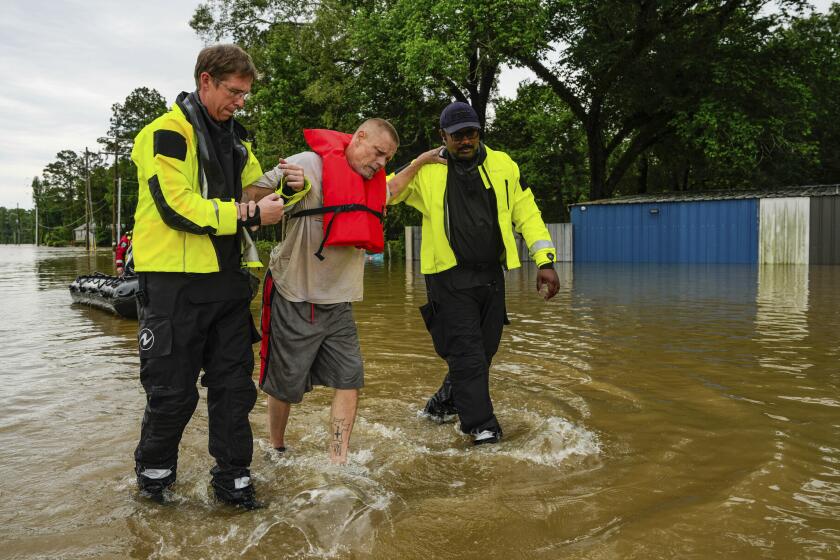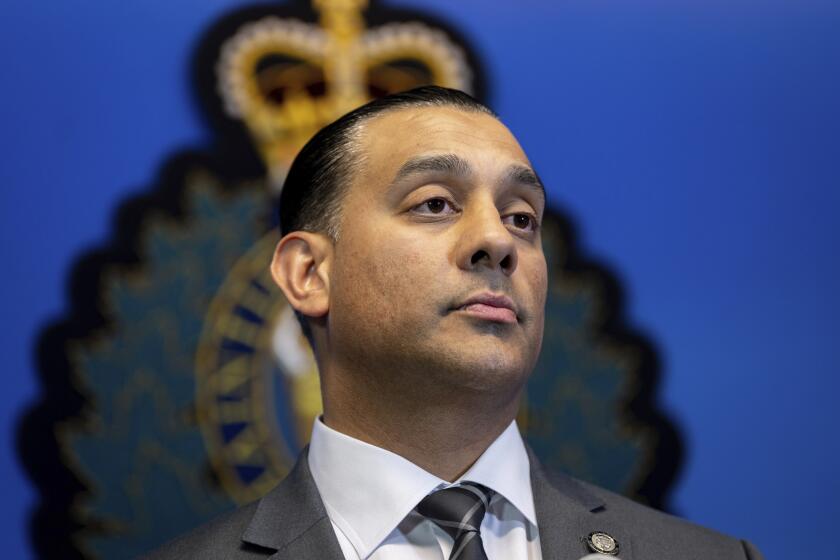Sihanouk Tries to Avert Cambodia Political Crisis : Elections: The prince seeks talks with leaders of two main parties on nation’s future. Royalists lead in vote count.
Prince Norodom Sihanouk intervened in Cambodia’s developing political crisis Wednesday, asking the leader of the government party and his son, who heads the opposition royalist party, to join him for talks about the nation’s future.
Sihanouk, the nation’s revered 70-year-old leader, acted after the government called for new elections in four provinces because of “voting irregularities” and threatened to repudiate the results of six days of voting last week.
With 90% of the regular ballots counted, the royalist party, known as FUNCINPEC, had won 45.7% of the vote on a national basis, and the government’s Cambodian People’s Party trailed with 38.1%, followed by 3.7% for the Buddhist Liberal Democratic Party, another opposition faction.
Voters in the election were choosing a new 120-seat assembly on a province-by-province basis. Based on the voting so far, it appeared that FUNCINPEC was likely to win 57 seats, while the government party had 52 seats and the Buddhist party had 10 seats.
The election was arranged by the United Nations under an October, 1991, peace agreement designed to end decades of civil war in Cambodia. But the government’s threat that it might reject the results left the country facing the possibility of renewed civil war.
Prince Norodom Sirivudh, Sihanouk’s half brother and one of the FUNCINPEC leaders, said the government’s threat provided “a golden opportunity” to the Khmer Rouge to resume fighting. Officially, the Maoist guerrillas boycotted the elections, though some did vote; but they did not carry through their threat to disrupt the voting.
“I hope we don’t have to go back to the jungle,” Sirivudh told reporters in a veiled threat to resume the fighting if the government rejects the results of the balloting.
Before the 1991 peace agreement, FUNCINPEC and the Buddhist party were united with the Khmer Rouge in a guerrilla war against the regime in Phnom Penh.
Sirivudh said Sihanouk had sent a fax to his son, Prince Norodom Ranariddh, the FUNCINPEC party leader, and to Chea Sim, head of the government party, inviting them to lunch to discuss “important problems.” The letter called on the two leaders to meet to resolve “problems in the spirit of tolerance and absolute dedication to the nation and the people.”
Sirivudh said the meeting was being held up by the Phnom Penh government’s refusal to allow Ranariddh, who is visiting party loyalists in the town of Amphill near the Thai border, permission to land at the Phnom Penh airport.
Khieu Kanarith, a government spokesman, told reporters Wednesday that the Phnom Penh government is now considering the appointment of Sihanouk as prime minister of the next government, with Ranariddh and Phnom Penh Prime Minister Hun Sen as deputy premiers.
But he also said the government would never surrender control of the army.
Nonetheless, his olive branch to Sihanouk appeared to indicate that the Phnom Penh regime had not entirely abandoned the idea of accepting the results.
With neither of the two major parties commanding a majority in the Parliament, it appears that they have begun maneuvering for advantage before publication of the final results.
The Phnom Penh government followed up its threats to reject the election verdict by withdrawing its party agents from counting centers around the country. The party agents witness the vote counting.
Reginald Austin, head of the U.N.’s electoral component, acknowledged in a news conference the existence of “problems and irregularities” but said none of them was sufficient to “have a real impact on the results.”
“We’re dealing with human beings who make mistakes from time to time,” Austin said.
In its complaint to the United Nations, the Phnom Penh government has repeatedly questioned technical aspects of the voting, such as the seals on ballot boxes and whether invisible ink used to prevent voter fraud was washable. While raising potential problems, it hasn’t presented any evidence to prove that fraudulent voting actually took place.
Many Western analysts believe the government has seized on the inevitable problems of logistics to justify its repudiation of the voting because it has suffered a humiliating defeat.
In New York, the U.N. Security Council unanimously adopted a resolution calling on all sides to respect election results.
More to Read
Start your day right
Sign up for Essential California for news, features and recommendations from the L.A. Times and beyond in your inbox six days a week.
You may occasionally receive promotional content from the Los Angeles Times.






